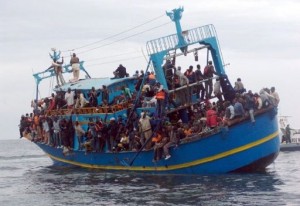By Sami Zaptia.
London, 11 June 2015:
On Sunday, the British government announced . . .[restrict]that it had decided to redirect some of the aid budget of its Department for International Development (DFID) into preventing illegal migration across the Mediterranean.
Prime Minister David Cameron told British media at the G7 Summit in Germany that there was ‘’a need to do more to stop these people leaving their countries in the first place. We need to deal with the causes of this migration not simply with its consequences’’.
The statement by Cameron is an acknowledgement and confirmation of the view that the so called ‘‘Libyan migration problem’’ is not a Libyan problem. It is a development and security problem at the point of origin: Africa, Syria and far beyond.
The migration problem needs to be solved by solving problems – usually economic, development and security problems in those countries. Libya is just a conduit, a stepping stone that has become more accessible since the breakdown of its institutions after the February 2011 revolution.
Indeed, Libya’s Deputy Prime Minister for Services Affairs Abdelsalam Al-Badri said at the Abdullah Thinni government press conference held in the eastern city of Al-Beida on 31 May that Illegal migration should be solved at source as well as on Libya’s shores.
‘’We have become a party to, in one way or another the issue of illegal migration that is debated in the corridors of the international community, and especially the European Union’’, he said.
‘’The EU sees that it should protect Europe by closing off Libyan shores. We do not object to the prevention of (illegal) migration. It should be codified’’, he agreed.
However, from a humanitarian point of view, he noted that ‘’The drowning of migrants in the Mediterranean and the silence regarding it, is a stain that history will remember from a moral perspective and in terms of the deliberate negligence in the commitment of the international community’’.
‘’We do not mind preventing migration but this must have two forms of prevention. It should be prevented at the source and prevented at the ports of export’’.
‘‘As well as a policy of development at the source of (illegal) migration (the international community) should help the Libyan state in stemming the great human flow’’, the Deputy Libyan Prime Minister explained.
It is quite clear that the EU should revisit its policy on deterring illegal migration through Libya and put in place a proactive comprehensive policy and not a reactive containment policy. European heads should be pulled out of the sand before the illegal migration problem through Libya becomes even bigger.
The policy of shooting boats full of migrants in the sea is a kneejerk reaction that plays to the anti-migration audiences in Europe. It is a policy of headlines and posturing. It is also a policy that is in reality impractical and can be become inadvertently cruel and inhumane. The EU should look at the root problems, not its symptoms.
Both the so-called pull and push factors affecting the illegal migration problem should be considered. Solving Libya’s (and Syria’s) current political problems will help solve the migration problem and the IS terror threat to those countries – and to Europe.
Early this week, the United Nations’ Bernardino Leon presented his fourth draft to the two antagonistic parties in Libya, but it seems that the House of Representatives has rejected the draft.
This is without doubt a setback for Libya and for the European effort to combat illegal migration through Libya.
Nevertheless, it is still not too late to amend the draft yet again and solve the Libya problem through a unified Libyan government. However, Europe should act now, while it still can. It needs to intensify its efforts to get both Libyan parties to agree a compromise deal. More carrots and sticks must be offered to both sides.
There is a school of thought that neither the carrots on offer nor the sticks waved at both the conflicting Libyan parties have been effective enough in persuading them to reach a consensus.
Libya has a relatively small population and has a deficit in labour supply. African labourers have always and will continue to travel to Libya for work. In fact, once Libya’s economy restarts there should be a million more African labourers in Libya.
Therefore, the migration problem facing Europe is not going to go away soon. The precedent and Libya routes across the Mediterranean have been set in the psyche of the migrant workers across all of Africa and beyond.
Sadly, it is going to be difficult to clear this perception in the minds of many migrant African workers that Aladdin’s cave – Europe – is just a treacherous sea trip away. No amount of ‘shooting boats in the water’ is going to dissuade poverty line African workers from attempting the perilous journey.
They will still choose to play the odds, which in their perception is sill stacked in their favour. Every African who successfully makes the journey will call back home with tales of free housing and free welfare payment which will spur-on a thousand other Africans to attempt the trek. These are the numbers that the Europeans are fighting against.
The migration problem is not going to go away as long as poverty continues to exist in Africa. There will always be this dynamic of movement of people from poorer to richer areas. It has always existed and in today’s world movement of people seems to be even faster.
The European policy towards the migration problem has got to be more sophisticated and comprehensive. It must be multifaceted approach. It must look at the migration problem as a symptom of the Libyan political and hence security problem. The African migrants have become a tool, a pawn in the hands of the various combatants in Libya. They are a source of funding and a source of political pressure on Europe.
There is a danger that shooting boats in the sea will only push the price of a boat trip up for the poor migrants. The Europeans should know better about market dynamics. As long as there are tens of thousands of migrants wishing to cross the Mediterranean, the supply of the service will be facilitated.
There is also the possibility that shooting boats in the sea could push smugglers underground and into adapting and adopting smaller and more frequent boats, making them more difficult to detect.
Ultimately, the shoot in the sea policy, if adopted could succeed in uniting the interest of IS and the more moderate militias as well as civilian smugglers. Many believe that the problem of illegal migration through Libya cannot be solved without solving the wide spread dissemination of arms in Libya.
The international community needs to urgently support a strong Libyan state with strong institutions including a functioning police, army and border patrols.
There is also the wider issue of subsidy reform to end the role of the illicit trade of subsidizing the trade in drugs, arms and illegal migrants. This will require policies of regional development, jobs and decentralization of money and power in Libya.
The problem of illegal migration through Libya is not so simple, and simplistic solutions are a denial of the complexity of the problems facing Europe and Libya. The sooner all wake up to these complexities and start to work on a plethora of solutions the better for Europe and Libya. Containment is no solution – working on proactive comprehensive solutions is the answer to the Libya problem. [/restrict]









